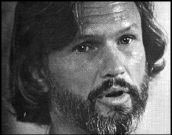The first time I came across Kris Kristofferson—in both senses of the word—was in a 1976 issue of Playboy. Gay porn being in short supply in our suburban Virginia home, I was forced to sate my hyperactive libido with the rare flashes of male nudity I could find in the stack of skin mags Dad kept in the basement. Thus one afternoon, I found myself developing an intimate relationship with a pictorial, culled from his motion picture The Sailor Who Fell From Grace With the Sea, that depicted the scrawny-assed, bearded star and actress Sarah Miles in positions that looked as uncomfortable as anything I’d ever caught on PBS’ Lilias! Yoga and You!
Nearly 20 years would pass before I gave the infamous singer-actor much further consideration. I caught his performances in movies like Trouble in Mind and Alice Doesn’t Live Here Anymore (being an intense Streisand-phobe, I have yet to watch the mid-’70s remake of A Star Is Born). In college, a particularly funny ex-boyfriend of mine would occasionally croon the Kristofferson-penned Johnny Cash hit “Sunday Mornin’ Comin’ Down,” anthem of chronic hangover sufferers everywhere, if we’d tied one on the night before. But it was only a few years ago that I finally succumbed completely to his irascible charms.
My roommate and I were hosting the latest in a series of alphabet-themed dinner parties and were stuck with the letter K. While she baked pans of kugel and nursed her Kahla-fortified White Russian, I compiled mix tapes. Realizing that Chaka Kahn, KMFDM, and Eartha Kitt would only carry us so far, I purchased a 99-cent copy of Kristofferson’s eponymous 1970 debut LP (retitled Me and Bobby McGee in 1971, but reissued on CD last year under its original name and with four bonus cuts).
Listening to the shambling opener, “Blame It on the Stones,” I immediately grasped why Village Voice critic Robert Christgau—whose curmudgeonly opinions I normally disregard—dismissed Kris as “the worst singer I’ve ever heard” when Kristofferson was originally released. Sinatra he ain’t. But I quickly grew to appreciate the Texas native’s coarse delivery and, more importantly, how it animated the outlaws and outsiders that populated the original versions of songs that later supplied the likes of Cash and Janis Joplin with signature hits.
Although his stalled acting career (Heaven’s Gate can do that to a man) finally kicked back into gear a couple years ago, thanks to roles like vampire hunter Abraham Whistler in Blade, his musical profile has been woefully low for years. (His last CD, 1999’s The Austin Sessions, was comprised of new recordings of old material). So thank god for the compilation Don’t Let the Bastards Get You Down (on Jackpine Social Club), on which an assortment of artists—including several who owe their careers to Kristofferson’s role as one of the forefathers of the outlaw country movement—tackle 17 songs drawn almost exclusively from his first three albums.
Most tribute albums spark one of two reactions: (1) The mediocre reinterpretations of beloved favorites send listeners screaming to revisit the original recordings, or (2) stellar renditions by contemporary performers with ardent followings prompt a new generation to investigate an overlooked older artist. Miraculously, the bulk of Don’t Let the Bastards . . . manages to achieve the latter, while avoiding the pitfalls of the former. Former X frontman John Doe imbues “Bobby McGee” with a longing that borders on homoerotic, while Jon Rauhouse’s Hawaiian guitar illuminates the reading of “Help Me Make It Through the Night” by the Mekons’ Jon Langford (who, like Kris, knows a thing or three about drinking) and Chip Taylor of the Troggs like a string of Christmas lights. And although grizzled vets like Chuck Prophet, Kristofferson sideman Stephen Bruton, and Tom Heyman (ex-Go To Blazes) share Kris’ weather-beaten vocal timbre, it’s Chicago song-bird Kelly Hogan who nails his patented spoken-sung style for “Why Me” (and her harmonies with Edith Frost and Nora O’Connor make Linda, Dolly, and Emmylou’s sublime Trio sound like the worst of the Shaggs).
Don’t Let the Bastards . . . boasts its share of flaws, but they’re minor. Oranger’s faux-Morricone version of “Casey’s Last Ride” sounds like 101 Strings covering Wall of Voodoo, and Mother Hips’ take on “Sunday Mornin'” is so pristine you’d think liquor had never crossed their lips. But if newcomers like Dart, who mine a musical vein somewhere between the Cars and Magnetic Fields on “For the Good Times,” or Northern Lights, with their polished power-pop stab at “The Law Is for Protection of the People,” turn youngsters on to Kristofferson for the first time, then bravo . . . even if their introduction to the man isn’t as, um, touching as my own.






